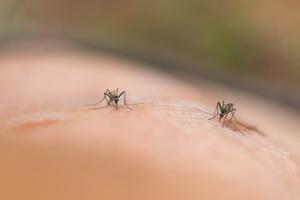Researchers Uncover Why Mosquitoes Prefer Some Festivalgoers

Researchers in the Netherlands have transformed a major music festival into a unique laboratory to explore why some individuals are more attractive to mosquitoes than others. Over the course of three days at the Lowlands Festival in Biddinghuizen, scientists conducted the “Mosquito Magnet Trial,” engaging over 500 volunteers in a study aimed at measuring personal attractiveness to these insects.
Festival Setting Offers Unique Insights
In an innovative setup, scientists created pop-up laboratories using shipping containers. Festivalgoers eagerly participated in the study, resting their arms against transparent acrylic boxes containing caged mosquitoes. Between 9 a.m. and 10 p.m. each day, a camera and computer system tracked mosquito movements, calculating a unique attraction score for each participant based on their scent.
The findings, which were published in a preliminary report on bioRxiv.org, revealed a fascinating range of results. Some individuals were significantly more appealing to mosquitoes, while others seemed to repel them. The research established unexpected links between specific habits and mosquito attraction.
Key Findings on Attractiveness Factors
One of the more striking discoveries was that festival attendees who had recently consumed beer were 44% more attractive to mosquitoes compared to those who refrained from alcohol. Similarly, individuals who had used cannabis also garnered higher attraction scores. Participants who had slept in close proximity to others the previous night registered increased appeal to mosquitoes, suggesting that human interactions may influence attraction levels.
Interestingly, the study identified a potential deterrent: individuals who applied sunscreen were about half as attractive to mosquitoes as those who did not use it. This finding may provide a simple strategy for reducing mosquito bites.
Leading the research, Felix Hol, a quantitative biologist at Radboud University Medical Center in Nijmegen, expressed enthusiasm about the public engagement with the project. “You’d hear loud cheers when a score popped up on the scoreboard,” he noted in a news release, highlighting the lively atmosphere surrounding the study. “I was really completely overwhelmed by the enthusiasm for the project and for science in general.”
While the findings offer intriguing insights, Hol cautioned that the study’s unconventional setting and the specific demographic of participants limit its generalizability. The conditions at the festival introduced various environmental factors, and the majority of volunteers were young attendees, which may not represent the broader population.
Despite these limitations, the study contributes valuable knowledge regarding human-mosquito interactions. Hol humorously summarized the practical implications of the findings: “If you don’t want to attract mosquitoes, don’t drink beer, don’t smoke weed, don’t sleep with people and put on your sunscreen.” Alternatively, he suggested, “You can do whatever you want and put on long sleeves.”
For further information on how to prevent mosquito bites, the U.S. Centers for Disease Control and Prevention provides additional resources.
As the research continues, scientists hope to expand their understanding of what makes certain individuals more appealing to mosquitoes, a question that has long intrigued both the scientific community and the general public.






